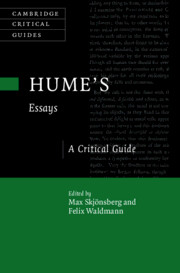Book contents
- Hume’s Essays
- Cambridge Critical Guides
- Hume’s Essays
- Copyright page
- Dedication
- Contents
- Figures
- Contributors
- Acknowledgements
- Abbreviations
- Introduction
- Part I Reception
- Chapter 1 The Reception of Hume’s Essays in Eighteenth-Century Britain
- Chapter 2 The Reception of Hume’s Essays in Eighteenth-Century Germany
- Chapter 3 ‘Aussi hardi … qu’aucun philosophe en France’:
- Part II Philosophy
- Part III Politics
- Part IV Political Economy
- Bibliography
- Index
- Cambridge Critical Guides
Chapter 1 - The Reception of Hume’s Essays in Eighteenth-Century Britain
from Part I - Reception
Published online by Cambridge University Press: 02 January 2025
- Hume’s Essays
- Cambridge Critical Guides
- Hume’s Essays
- Copyright page
- Dedication
- Contents
- Figures
- Contributors
- Acknowledgements
- Abbreviations
- Introduction
- Part I Reception
- Chapter 1 The Reception of Hume’s Essays in Eighteenth-Century Britain
- Chapter 2 The Reception of Hume’s Essays in Eighteenth-Century Germany
- Chapter 3 ‘Aussi hardi … qu’aucun philosophe en France’:
- Part II Philosophy
- Part III Politics
- Part IV Political Economy
- Bibliography
- Index
- Cambridge Critical Guides
Summary
This chapter explores the reception of David Hume’s Essays in eighteenth-century Britain by linking computational methods of text reuse detection with more traditional approaches to the history of ideas. We find that many of Hume’s essays were frequently reprinted individually, in whole and in part, including in anthologies, grammars, style guides, and collections such as The Philosophical Dictionary, where editors often moulded for their readers what they took Hume’s message to be. As the century drew to a close, Hume’s essays were firmly integrated into the diverse landscape of eighteenth-century British literary culture. We reveal which essays underwent the most extensive reuse, carefully analysing them based on their respective collections and as individual titles. We find that, just because Hume ‘withdrew’ an essay from his collection, it did not necessarily mean it was withdrawn from the public eye. Several essays by Hume experienced evolving life cycles, and numerous authors incorporated his texts discreetly, some without explicitly acknowledging their use. Taking Hume’s essays as a whole, the range of topics and venues involved in the history of their eighteenth-century reuses is striking. Our story includes not only prominent political and economic thinkers, historians, philosophers, lawyers and clergy but also scores of hack writers, anonymous authors and a range of publishers, editors and compilers. The chapter demonstrates how a more comprehensive grasp of the reception of Hume’s Essays in eighteenth-century Britain accommodates all these facets.
Keywords
- Type
- Chapter
- Information
- Hume's EssaysA Critical Guide, pp. 15 - 35Publisher: Cambridge University PressPrint publication year: 2025

